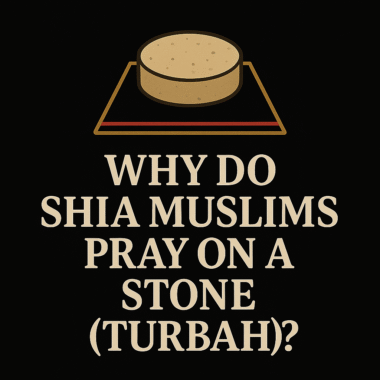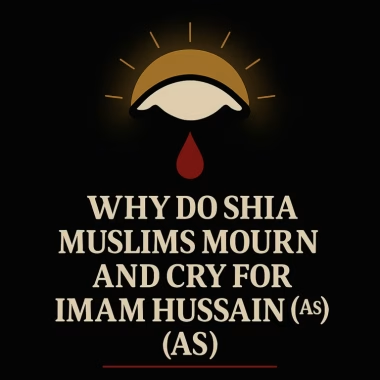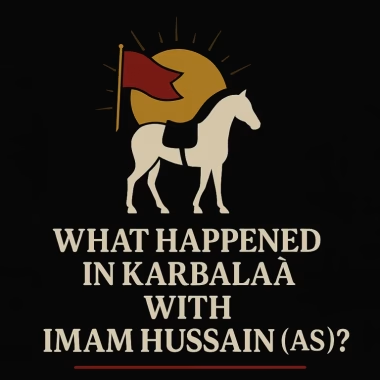No. Shia Muslims do not worship graves or the people buried in them. At shrines, Shia worship Allah alone. Ziyārah (visitation) means sending salām, making duʿāʾ to Allah, reflecting on death, and seeking tawassul (Allah’s help by the honour of His chosen servants). Worship (ʿibādah) belongs only to Allah.
Explanation
Visiting graves is a Sunnah of the Prophet ﷺ. He himself visited graves, encouraged his followers to do so, and taught that sending salām to him at his grave reaches him directly. The Qur’an also shows respect given to the righteous even at their resting places (18:21). The Prophet ﷺ warned against turning graves into sites of worship — meaning actual worship directed to the buried, not respectful visitation.
Shia Muslims, like Sunni scholars such as Imām al-Nawawī, uphold ziyārah as a recommended act of devotion, with strict conditions that all ṣalāh and duʿāʾ are directed to Allah alone.
Evidence
1) Qur’an and Sunnah on Visiting Graves
- Permissibility
Arabic: «كُنْتُ نَهَيْتُكُمْ عَنْ زِيَارَةِ الْقُبُورِ فَزُورُوهَا»
English: “I had forbidden you from visiting graves; now visit them.”
📖 Reference: Ṣaḥīḥ Muslim 977a - Prophet ﷺ visiting his mother’s grave
Arabic: «اسْتَأْذَنْتُ رَبِّي أَنْ أَسْتَغْفِرَ لَهَا فَلَمْ يُؤْذَنْ لِي، وَاسْتَأْذَنْتُهُ أَنْ أَزُورَ قَبْرَهَا فَأُذِنَ لِي، فَزُورُوا الْقُبُورَ»
English: “I asked my Lord to allow me to seek forgiveness for her — He did not permit me; I asked Him to allow me to visit her grave — He permitted me. So visit graves.”
📖 Reference: Ṣaḥīḥ Muslim 976a/976b - Salām reaches the Prophet ﷺ at his grave
Arabic: «مَا مِنْ أَحَدٍ يُسَلِّمُ عَلَيَّ إِلَّا رَدَّ اللَّهُ عَلَيَّ رُوحِي حَتَّى أَرُدَّ عَلَيْهِ السَّلَامَ»
English: “No one sends salām upon me except that Allah returns my soul to me so I may return his salām.”
📖 Reference: Sunan Abī Dāwūd 2041 - Prophets’ bodies remain preserved
Arabic: «إِنَّ اللَّهَ حَرَّمَ عَلَى الْأَرْضِ أَنْ تَأْكُلَ أَجْسَادَ الْأَنْبِيَاءِ»
English: “Allah has forbidden the earth to consume the bodies of the prophets.”
📖 Reference: Sunan Abī Dāwūd 1047 - Qur’an — honouring the righteous at their graves
Arabic: ﴿…لَنَتَّخِذَنَّ عَلَيْهِمْ مَسْجِدًا﴾
English: “…we will surely build a masjid over them.”
📖 Reference: Qur’an 18:21
📌 Takeaway: Grave visitation is Qur’anic and Prophetic Sunnah — a reminder of death and a way of sending salām.
2) The Hadith Against Taking Graves as Mosques
Arabic: «لَعَنَ اللَّهُ الْيَهُودَ وَالنَّصَارَى اتَّخَذُوا قُبُورَ أَنْبِيَائِهِمْ مَسَاجِدَ»
English: “May Allah curse the Jews and Christians; they took the graves of their prophets as places of worship.”
📖 Reference: Ṣaḥīḥ Muslim 529–531; Ṣaḥīḥ al-Bukhārī 3453–3454
📌 Meaning: prostrating to the buried or worshipping them is forbidden. Shia agree:
- Sujūd is only to Allah, facing the qiblah.
- Ṣalāh is never directed at a grave.
- Duʿāʾ is made only to Allah, with tawassul as permitted by Qur’an (5:35).
Balanced warning hadith:
Arabic: «لا تَجْعَلُوا قَبْرِي عِيدًا…»
English: “Do not make my grave an ʿĪd (recurring festival). Send blessings upon me, for your blessings reach me wherever you are.”
📖 Reference: Sunan Abī Dāwūd 2042
📌 Meaning: Avoid idolatrous practices, but sending salām and visiting graves is recommended.
3) Sunni Precedents for Ziyārah
- Imām al-Nawawī, al-Adhkār:
Arabic: «اعْلَمْ أَنَّهُ يَنْبَغِي لِكُلِّ مَنْ حَجَّ أَنْ يَتَوَجَّهَ إِلَى زِيَارَةِ رَسُولِ اللَّهِ ﷺ… فَإِنَّ زِيَارَتَهُ ﷺ مِنْ أَهَمِّ الْقُرُبَات»
English: “It is proper for everyone who performs Ḥajj to proceed to visit the Messenger of Allah ﷺ… for visiting him is among the most important acts of devotion.” - Imām al-Nawawī, al-Majmūʿ: recommends greeting the Prophet ﷺ at his rawḍah, then making duʿāʾ to Allah.
📌 Sunni and Shia agree: ziyārah is an act of devotion, provided worship is directed to Allah.
4) Shia Hadith on Ziyārah
- Imam al-Bāqir (AS):
Arabic: «مَنْ زَارَ قَبْرَ الْحُسَيْنِ بْنِ عَلِيٍّ (ع) عَارِفًا بِحَقِّهِ كَانَ كَمَنْ زَارَ اللَّهَ فِي عَرْشِهِ»
English: “Whoever visits the grave of Hussain ibn ʿAlī (AS) knowing his right, it is as if he has visited Allah on His Throne.”
📖 Reference: Ibn Qulawayh, Kāmil al-Ziyārāt, ch. 62 - Imam al-Ṣādiq (AS):
Arabic: «إِنَّ الْحُسَيْنَ بْنَ عَلِيٍّ (ع) قُتِلَ مَظْلُومًا، وَاللَّهِ إِنَّ زِيَارَتَهُ لَتُحِطُّ الذُّنُوبَ الْعِظَامَ»
English: “Indeed, Hussain ibn ʿAlī (AS) was killed oppressed, and by Allah, his visitation removes great sins.”
📖 Reference: Kāmil al-Ziyārāt, ch. 67
📌 Shia sources make clear: ziyārah is about recognising the Imams’ right and seeking Allah’s mercy through them.
5) What Shia Actually Do at Shrines
✅ What they do:
- Send salām and recite Qur’an.
- Make duʿāʾ to Allah, often with tawassul.
- Give charity, reflect on mortality, renew repentance.
❌ What they don’t do:
- Pray to the buried.
- Prostrate to a grave.
- Believe saints have independent power.
📌 All worship remains solely for Allah.
Conclusion / Summary
Ziyārah is not worship of graves. It is sending salām, remembering Allah, and seeking His mercy through His chosen ones, as the Qur’an and Sunnah allow. Both Sunni and Shia traditions recommend respectful ziyārah. Shia hadith emphasise the immense spiritual reward of visiting the graves of the Imams (AS), while making clear that all worship belongs to Allah alone.
Quick FAQ
Q: Isn’t asking at a grave shirk?
❌ No. Shirk is worshipping other than Allah. Shia ask Allah alone while honouring His wasīlah (means) — Qur’an 5:35.
Q: But you face the shrine!
Facing the grave for salām is adab (etiquette). For ṣalāh, Shia face the qiblah. Sunni scholars like al-Nawawī outline the same etiquette for visiting the Prophet ﷺ.
Q: Why go there at all?
The Prophet ﷺ encouraged grave visitation (Muslim 977a) and himself visited his mother’s grave (Muslim 976a/976b). He also taught that salām reaches him at his grave (Abū Dāwūd 2041).
References
- Qur’an — 5:35; 18:21.
- Ṣaḥīḥ Muslim — 976a/976b (Prophet ﷺ visiting his mother’s grave), 977a (permission to visit graves), 529–531 (curse for taking graves as masjids).
- Ṣaḥīḥ al-Bukhārī — 3453–3454 (curse for taking graves as masjids).
- Sunan Abī Dāwūd — 1047 (prophets’ bodies preserved), 2041 (salām reaches the Prophet ﷺ at his grave), 2042 (grave not made into a festival).
- Imām al-Nawawī — al-Adhkār (recommendation to visit the Prophet ﷺ after Ḥajj), al-Majmūʿ (ziyārah etiquette at the Prophet’s rawḍah).
- Ibn Qulawayh, Kāmil al-Ziyārāt — ch. 62 (Imam al-Bāqir on reward of visiting Hussain), ch. 67 (Imam al-Ṣādiq on ziyārah removing sins).










